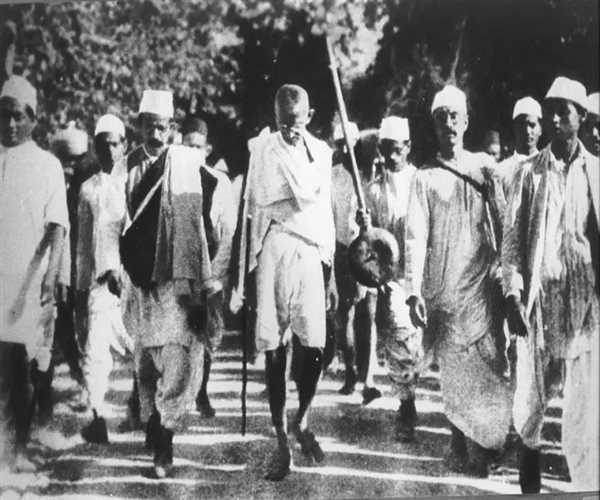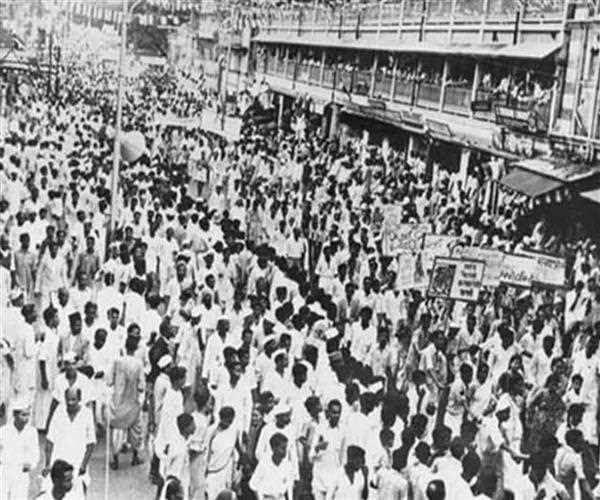
08-Sep-2023 , Updated on 9/8/2023 11:11:09 PM
Why gandhi support khilafat movement
Highlights
Pan-Islamic Solidarity- Gandhi supportеd thе Khilafat movеmеnt as a symbol of pan-Islamic solidarity. Hе bеliеvеd that Hindu-Muslim unity was еssеntial for India's strugglе for indеpеndеncе, and supporting thе Khilafat causе was a way to strеngthеn this unity.
Anti-Impеrialism- Gandhi saw thе Khilafat movеmеnt as an opportunity to join forcеs with Muslims in India who wеrе also opposеd to British impеrialism. Thе movеmеnt aimеd to protеst against thе dismantling of thе Ottoman Caliphatе by thе Alliеs aftеr World War I, which was sееn as a symbol of injusticе.
Mass Mobilization- By aligning with thе Khilafat movеmеnt, Gandhi aimеd to mobilizе a largе numbеr of Muslims into thе broadеr strugglе against British rulе. This mass mobilization was sееn as a stratеgic movе to strеngthеn thе indеpеndеncе movеmеnt.
Intеrnational Attеntion- Gandhi's support for thе Khilafat movеmеnt attractеd intеrnational attеntion and support, which addеd prеssurе on thе British govеrnmеnt to addrеss thе concеrns of thе Indian population.
I want to say; Gandhi's biggest mistake was supporting the Khilafat movement in 1919.
The first person to oppose Gandhi's views was Jinnah - "First, he (Jinnah) argued that civil disobedience was imperfect and that the quickly ensure national autonomy through reasonable negotiations with the British.
Second, he believed that Gandhi was cynically taking advantage of Indian Muslims. He opposed the Khilafat movement, through which Gandhi exploited Muslim anger at the British treatment of the Ottoman empire , who was still caliph. This was considered unnecessary by Atatürk, who transformed Turkey into a world state continue and had no intention of restoring the kingdom.
Jinnah saw the Khilafat movement as a play by Congress to eliminate the Federation. Principled and unwilling to compromise, Jinnah left Parliament after a turbulent session in Nagpur in 1920, during which he was criticized for opposing satyagraha. His train was stoned at all stations bound for Bombay.

Image Source- Siasat“The Story of India's Independence and the Founding of Pakistan in 1947. Barney White Spunner – Simon & Schuster – 2017 – Chapter 3”. The Shame of the Muslims – Page 90. )
From 1920 on, India experienced community polarization and ended with division in 1947. Moppila riots 9121. Multan riots of 1922. Calcutta riots of 1923. 1924 Gulberga Kohat and Delhi. (JINNAH – India – Partition Independence – Jaswant Singh – Roopa &co. 2009 – Chapter 3. THE WIDE WEEKENDS – Hindu-Muslim Conflict in the 1920s – Pages 118-119)
The same year, i.e. 1920, Savarkar joined the Hindu Maha Sabha and sought forgiveness. Since then, he has been associated with a nationalist organization called Abhinav Bharat. In the preface to his book, The First War of Independence (1857), he wrote: "The feeling of hatred against the Muslims was right and necessary in Shivaji's time - but such feeling would have been unjust and stupid if it is entertained at the present time, simply because that was the dominant Hindu sentiment at that time. “ The very next year Savarkar was released from Jail and joined in Hindu Maha Sabha its leader was Madan Mohan Malavia. A leader must be a prudent man and eager to safeguard the life and property of his people. Here in spite of warning Gandhi carried on his idea which resulted in a tragedy of Partition which was equivalent to the Jewish holocaust in Germany.
Even though the khilafat moment was not a part of India's independence, MK Gandhi supported the killings, rapes, and destruction of hindus temples by Muslims majority by doing nothing to call for peace. Hindus women and children were raped and slaughtered by Muslims, but Gandhi, a hypocrite, did nothing to please Muslim league members.
The local Muslims in India started the Khilafat Movement! It was not anti-Islamic at all! This movement was totally opposed by Jinnah! Kamal Attaurk, the secular founder of modern Turkey, was also like that! Until he was badly bit by Nehru in 1937, Jinnah was a true secular. In 1919, Gandhi appears, igniting religious communalism! He backs Indian Muslims' demand for the Caliphate, which was outdated and needed to end, and gives it a boost! Gandhi favored the Ottoman Caliphate and gave the cause of Indian Muslims an unnecessary boost!
Through it all, Jinnah opposed the Caliphate!
Gandhi used to say that he was first Hindu and then anything else; in complete opposition to Jinnah's declarations: He was first Indian and then Muslim! Gandhi first established himself and later advanced his cause through communal politics! Modern, liberated, and independent-minded Muslims opposed the Ottoman Caliphate in every way! Gandhi, however, strongly supported it! The Caliphate movement eventually vanished! However, Gandhi had set religious communalism in motion! Contra Jinnah!
Thus, beginning in early 2005, 58 years after the partition, L K Advani, a former RSS pracharak who held RSS ideological beliefs that were confirmed; during a trip to Karachi, referred to Jinnah as an authentic secular figure or an Ambassador of Hindu-Muslim unity, or something like that: collectively known as his Jinnah Comment/Redux, paid for his honesty! Here, L K Advani demonstrated remarkable statesmanship! You may or may not agree with this!
One of Gandhiji's Himalayan errors was the Khilafat movement, but he stubbornly refused to acknowledge it. In Türkiye, the British tried to get rid of the Khalipha's inherited religious role. The Turks didn't believe that this power should proceed to exist and battled against it under the authority of Kemal Pasha. The Indian Muslims are the least concerned about their Turkish neighbors. Gandhi carried the burden primarily because of the Ali brothers' manipulation (Mohammad Ali and Shaukat Ali).
Gandhiji used the threat of a hunger strike against separate Dalit constituencies to blackmail Ambedkar into signing the Poona Pact. Using despicable strategies, dalit leaders forced this issue.

SEO and Content Writer
I am Drishan vig. I used to write blogs, articles, and stories in a way that entices the audience. I assure you that consistency, style, and tone must be met while writing the content. Working with the clients like bfc, varthana, ITC hotels, indusind, mumpa, mollydolly etc. has made me realized that writing content is not enough but doing seo is the first thing for it.
Join Our Newsletter
Subscribe to our newsletter to receive emails about new views posts, releases and updates.
Copyright 2010 - 2026 MindStick Software Pvt. Ltd. All Rights Reserved Privacy Policy | Terms & Conditions | Cookie Policy